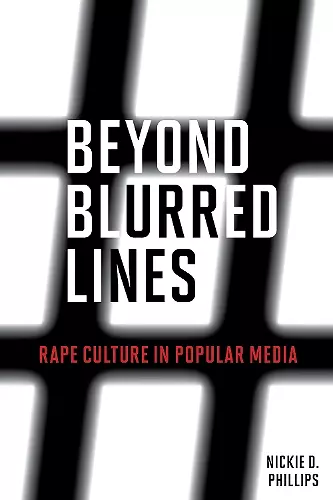Beyond Blurred Lines
Rape Culture in Popular Media
Format:Paperback
Publisher:Rowman & Littlefield
Published:10th Sep '18
Currently unavailable, and unfortunately no date known when it will be back
This paperback is available in another edition too:
- Hardback£41.00(9781442246270)

From its origins in academic discourse in the 1970s to our collective imagination today, the concept of “rape culture” has resonated in a variety of spheres, including television, gaming, comic book culture, and college campuses. Beyond Blurred Lines traces ways that sexual violence is collectively processed, mediated, negotiated, and contested by exploring public reactions to high-profile incidents and rape narratives in popular culture. The concept of rape culture was initially embraced in popular media – mass media, social media, and popular culture – and contributed to a social understanding of sexual violence that mirrored feminist concerns about the persistence of rape myths and victim-blaming. However, it was later challenged by skeptics who framed the concept as a moral panic. Nickie D. Phillips documents how the conversation shifted from substantiating claims of a rape culture toward growing scrutiny of the prevalence of sexual assault on college campuses. This, in turn, renewed attention toward false allegations, and away from how college enforcement policies fail victims to how they endanger accused young men. Ultimately, she successfully lends insight into how the debates around rape culture, including microaggressions, gendered harassment and so-called political correctness, inform our collective imaginations and shape our attitudes toward criminal justice and policy responses to sexual violence.
Phillips, an associate sociology and criminal justice professor at St. Francis College in Brooklyn, devotes this thoughtful study to the concept of rape culture, showing how it has reshaped public debate. Phillips explains the term’s transition from being used principally within feminist academe—where it originated in the 1970s—to becoming a topic of discussion throughout mainstream media. Exploring recent subjects of controversy, including the social media– fueled national interest in the Steubenville, Ohio, sexual assault case; the depiction of sexual violence on television; misogyny within gaming culture; and the incidence of assaults on college campuses, she maintains that today’s increased discussions around the topic have created a 'media-cultural environment that ultimately impacts politics and policy making.' The book also shows that, although much work remains to be done in clarifying and improving college disciplinary policies, enforcement of existing rules against sexual assault is making headway across campuses. And, as Phillips acknowledges, the media coverage of sexual assault cases and increased discussion of rape culture has raised cultural awareness and a move toward 'finding solutions that lie outside the scope of criminal justice.' This new book will contribute to an important conversation. * Publishers Weekly *
Sociologist Phillips explains that ‘rape culture’ as a concept has existed for over 25 years, but has only become popularized in the last decade. Phillips does not aim to show statistics about rape or showcase in-depth interviews with victims. Rather, she relies on extensive data and resources to unearth how ‘rape culture entered the collective imagination.’ Although the concept was originated among academics and legal scholars, it began to be used to explain sexual violence that occurred on a day-to-day basis. Phillips explains that the phrase was used to describe, characterize, or criticize performances on the Video Music Awards, or allegations against Bill Cosby and others on popular media. TV shows, comic books, and video games have similarly brought rape culture into mainstream culture. The author aptly examines college campuses as well as how Title IX has impacted the on-campus dynamics around sexual assaults. This book has significant value not because it discusses why rape happens or what caused rape culture, but because it traces the history of the concept and its social meaning. Summing Up: Highly recommended. All academic levels/libraries. * CHOICE *
This fascinating and erudite book traces the genealogy and resurgence of "rape culture" as a popular but highly controversial concept in the collective imagination. Phillips expertly and impartially investigates opposing debates on issues such as "slut-shaming", statistics, political correctness, trigger warnings, censorship and false allegations. She argues that rape culture has become a prominent lens from which to view a number of high profile examples, including the New Delhi, Steubenville (Ohio), #gamerGate, and college sexual assault cases, as well as representations of rape and misogny in popular culture. This is critical reading for scholars and non-scholars alike on the important and ever-relevant issue of sexual violence in our contemporary society. -- Nicola Henry, PhD, Senior Lecturer, La Trobe University (Australia)
In Beyond Blurred Lines Nickie Phillips delivers an uncompromising, critical and long-overdue analysis of the concept and manifestations of rape culture. From news coverage of sexual violence, to its representations in popular culture, to public responses in social media, to online harassment, and sexual assault on college campuses, Phillips traces the contested history and contemporary debates regarding rape culture's nature and existence, foremost in the United States. A must read for feminist and cultural scholars who seek to understand how 'rape culture' has shifted from academic to popular discourse and how the concept has come to occupy part of a national, if not global, debate about sexual violence against women. Phillips also provides a compelling account of how rape culture is perpetuated, and how it might be stopped. -- Anastasia Powell, PhD, Senior Research Fellow, Justice and Legal Studies, RMIT University (Melbourne, Australia)
ISBN: 9781538122341
Dimensions: 230mm x 151mm x 23mm
Weight: 458g
306 pages